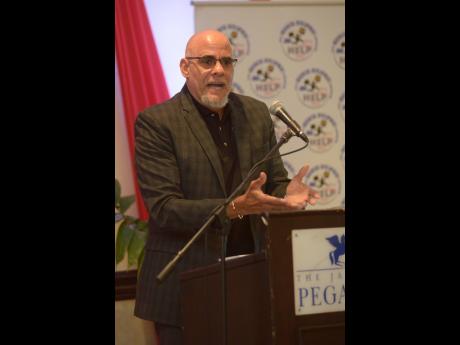EPOC fears growth will slow
Keith Duncan wants the Jamaican Government to fast-track pension reform, amid other measures to stimulate the economy, to shield against a global slowdown.
“I am not saying that Jamaica will enter into a recession. I am highlighting that we are seeing a downturn in economies globally, which could spill over into Jamaica,” the co-chair of the Economic Programme Oversight Committee (EPOC) told the Financial Gleaner in an interview on Tuesday.
His comments on the matter were made initially on Monday at an EXIM Bank strategy session for the board and management. Duncan is also the CEO of JMMB Group, a financial services conglomerate that operates businesses in Jamaica, Trinidad & Tobago, and Dominican Republic.
The Jamaican economy is expected to grow 1.3 per cent to 1.5 per cent for fiscal year 2019-20, which is a percentage lower than projected, because of contraction in agriculture.
As an offset, Duncan wants the authorities to boost the scope of pension fund investments, retrain people, and deal with crime and corruption, which cost the country some “3.0 per cent of gross domestic product”.
Private pension funds hold $600 billion of assets, but how they invest those funds are heavily regulated, with caps on different asset classes.
Duncan wants more focus on increasing domestic investments, including venture-capital projects, which has a limit of 5 per cent of portfolios.
“The venture-capital market is very underdeveloped, so this is a good start. As this asset class matures, there could be upward revisions,” he said.
In July, the International Monetary Fund lowered the global growth forecast because of fallouts from the trade war between China and the United States, and the uncertainties surrounding the United Kingdom’s exit from the European Union, referred to as Brexit.
The IMF projected global growth of 3.2 per cent in 2019, and 3.5 per cent in 2020, which is 0.1 percentage point lower than earlier forecasts for both years.
Duncan said the external events could lead to slowdowns in Jamaica’s tourism and mining sectors.
“However, if Jamaica experiences growth in other sectors, for example construction, manufacturing, and agriculture and fisheries, this could offset any fall-off in the sectors at risk,” he stated, indicating the need for increased investments.
Jamaica has registered growth in 18 consecutive quarters, albeit at small levels. The country’s level of indebtedness has also been declining and is now about 100 per cent of GDP, its lowest ratio in nearly 20 years.
Duncan said that the budget, for the first time in decades, has allocated $20 billion or approximately 1.0 per cent of GDP to the spend on national security in an effort to modernise the security infrastructure, for example, the purchase of police vehicles, investment in the forensic capability, rehabilitation of police stations, and equipment for border patrol.
“Unfortunately, we as a country, due to fiscal constraints, allowed our national security infrastructure to depreciate to the point that the police were ill equipped to manage the rising levels of crime. Increased capacity is also critical to managing the scale of crime,” said the EPOC co-chair.
EPOC is chaired dually by a private-sector representative and the central bank governor.
As for corruption, that problem is unlikely to be eradicated, but it can be reduced, Duncan added.
“Jamaicans really are somewhat doubtful of our will as a country to significantly reduce corruption. I don’t think corruption can be stopped, but it can be reduced by the Integrity Commission and MOCA investigating and actually bringing cases to the nation’s courts for prosecution,” he said.

